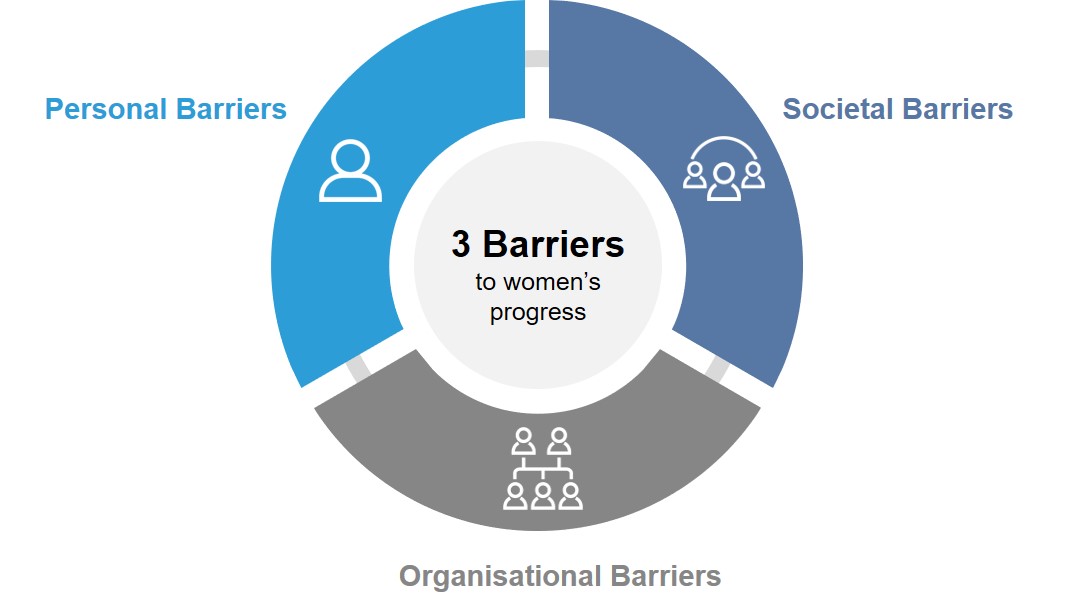The 3 barriers holding your career back and what to do about them
Are you told you have great potential and are a valued member of the team but still find yourself overlooked for promotion or high visibility projects? Do you sometimes feel that your efforts aren’t paying off and you’re facing invisible obstacles trying to progress your career?

#genderequality #careerprogression
Most of the approaches to gender equity put the responsibility on women to change and adapt to workplace structures, organisational culture or leadership styles. But the reality is that not all the barriers we face are within our control.
I’ve spent the last decade looking at senior level progression for women, particularly in large multinationals and have identified three critical barriers: societal, personal and organisational. Let’s take a look at them more closely.

1. Societal barriers
These are the subtle cues and messages we receive over a lifetime, reinforcing how men and women ‘ought’ to behave. They influence how domestic tasks are split, the cost of childcare and the value of work in society. Here are the key ones to watch out for:
-
Gender stereotypes: by age six children already associate intelligence with men and niceness with women. Society encourages girls to be nurturing and boys to be assertive and problem-solving. In the workplace these ‘masculine’ traits are often seen as crucial for leadership but labelled as bossy or domineering in women.
-
Double burden: in the UK women spend nearly double the time men do on domestic tasks. This ‘double burden’ means they many women feel compelled to make career compromises that they often can’t recover from in terms of earnings or progression.
-
Flexible working: flexible working (such as working remotely or part-time) has been used by many women to try balance work and child (or elder) care obligations, creating a stigma for women which in turn can become a ‘career killer’. With covid proving working from home is possible for both sexes, this stigma is reducing, however the stigma associated with part-time work remains.

2. Organisational Barriers
Set within the workplace, organisational barriers are either structural or cultural.
Structural barriers are typically outside women’s control and fuelled by bias.
-
Sponsorship: is a key component to career progression but men have significantly higher levels than women (50% higher at senior level). Without an inside advocate, women are often overlooked during closed-door succession discussions.
-
Equal networks: powerful networks can influence the speed and likelihood of promotion but where men tend to have combined work and social networks, women’s are often separate. The extra effort of maintaining two networks means that women can miss out on the support, access to insider information, and ties to elites that come with strong networks.
-
Critical experiences: by ‘off-ramping’ their careers for childcare women risk missing the important high profile and visible assignments that often accompany this career phase. Missing out on these critical experiences is a key risk to women’s career progression, with studies finding that men achieve more promotions during these years than women.
Cultural barriers are the workplace norms that can perpetuate societal biases.
-
Unconscious bias: societal attitudes are that ‘men take charge and women take care’. So when women perform well in traditionally male roles, such as leadership, it runs counter to our stereotype expectations and their success is subject to greater scrutiny than it would be for men.
-
Microaggressions: many unconscious biases play out in microaggressions towards women, such as having to provide more evidence of competence, being interrupted, having their comments dismissed or undermined, or being mistaken for someone more junior.
-
‘Always on’ culture: most organisations demands 24/7 availability of their senior leaders. This expectation is incredibly difficult for women to manage when they bear a disproportionate domestic responsibility and is one of the most significant obstacles to career advancement for women.

3. Personal barriers
These are about how women present at work. Their confidence, their willingness to self-promote and engage in activities seen as stereotypically male.
-
Meeting the criteria: women tend to only apply for jobs where they meet 100% of the criteria, (compared to 60% for men). Confidence is a complex issue but we know that women are often held to a higher standard and assessed on their performance and track record, whereas men are typically rated on potential.
-
Invisible work: it’s suggested that career success is 10% performance, 30% personal branding and a whopping 60% exposure. So doing great work is important, but it’s more important who sees it. Yet women are less likely to self-promote, believing that positive job performance will be noticed and rewarded on merit alone.
-
Political savvy: is the ability to effectively understand others at work, how decisions get made, and to use this knowledge to influence the achievement of organisational goals. Political skill is a key asset for progression, especially in male-dominated organisations. Yet many women are reluctant to engage in politics, seeing it as sleazy or distasteful.
-
Leadership vs likeability: research shows that men’s likeability is positively correlated with success, but for women it’s much harder to be seen as both competent and likeable. As such, women suffer a ‘likeability penalty’ in roles traditionally associated with men, such as leadership.

So where do you focus your energies?
It’s important to recognise that many of the obstacles you face in progressing your career are outside of your control. Some are societal, others exist within organisations. But there are things you can do to positively impact your career:
-
Apply for bigger roles even when you don’t meet all the criteria.
-
Get a sponsor, ideally someone at least two levels above you (we will explore how to do this in next month’s blog).
-
Self-promote by raising the profile of your work and by asking for high visibility assignments and opportunities (especially important for those returning from career off-ramping).
-
Develop and utilise your network by making sure you have people who can help you in 3 key areas: operationally, strategically and in your professional development (read this blog for more).
-
Become an advocate for yourself and for others. Share your achievements and those of other women in your organisation.
-
Become politically savvy by getting to know the key players, and how decisions are made within your organisation.
-
Never underestimate your own potential. Remember that when tested, 70% of men rate their performance better than their colleagues, while 70% of women rate theirs equal to their colleagues.
Sharon Peake is the founder and MD of Shape Talent Ltd, a gender equality coaching and consulting business established with the sole purpose of getting more women into senior leadership roles in business. We work with organisations to remove the barriers to women’s progression and we work with individual women, helping them to achieve their career potential.
Click here to learn more about what we do and join our mailing list to be the first to receive our tools, research and updates.
Sharon Peake
Founder, CEO and Executive Coach
I am an experienced business leader and executive coach with over 20 years' experience in global blue chip businesses focused on career development for individuals and strategic people management for organisations. Over the course of my career I have interviewed thousands of individuals and helped organisations select and grow the best talent. I know what helps careers, and I know what hinders careers. I truly believe that the world would be a better place with as many women as men running companies, which led me to establish Shape Talent - a gender diversity coaching and consulting business geared at accelerating gender equality in business and beyond. In my coaching work I specialise in helping women leaders and executives to achieve their potential, navigate career transitions and ensure a fulfilling and rewarding career. As a Chartered Occupational Psychologist I bring a psychological perspective to my coaching, looking at the underlying factors that influence the way we behave and respond to situations. Where it helps the client I can use a range of psychometric assessments to bring greater clarity and self-awareness to patterns of behaviour. My clients describe me as insightful, open, warm, encouraging and focused on ensuring the client’s success.



